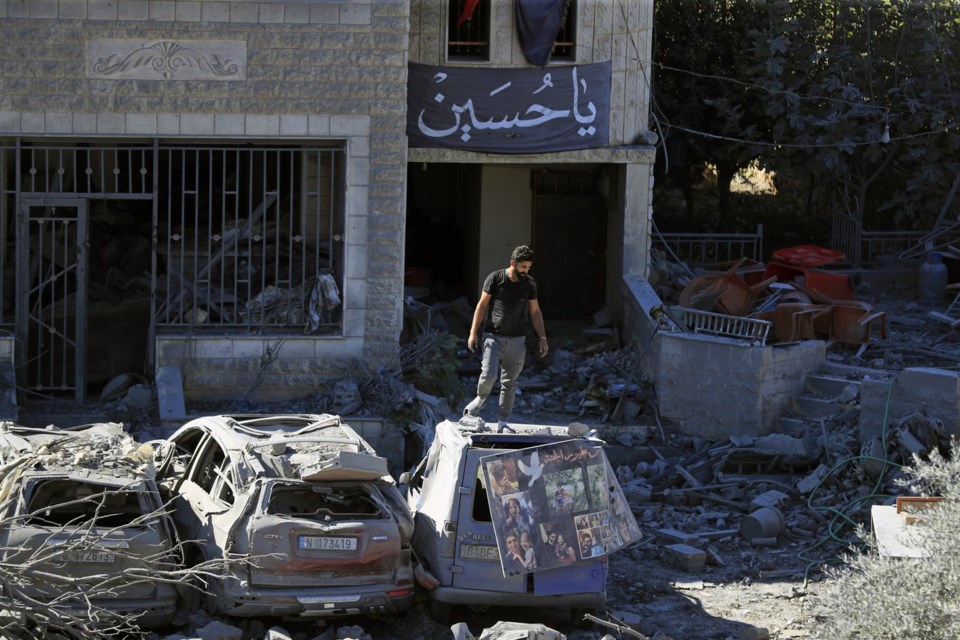OTTAWA — Canada joined the United States, other G7 allies and several Middle Eastern nations Thursday to call for an immediate ceasefire at the Israel-Lebanon border after a dramatic increase in airstrikes in recent days, but Israeli Prime Minister Benjamin Netanyahu remained defiant as he arrived in New York City for the United Nations General Assembly.
Hundreds have been killed in Lebanon this week as Israel targeted Hezbollah's military capacities in what it said was a bid to stop more than 11 months of cross-border fire by the Iranian-backed group into Israel.
In a joint statement published Thursday morning, all G7 nations and the European Union, along with Australia, Saudi Arabia, Qatar and the United Arab Emirates, said the fighting in Lebanon that escalated after the Hamas attack on Israel almost a year ago, "presents an unacceptable risk of a broader regional escalation."
"This is in nobody's interest, neither of the people of Israel nor of the people of Lebanon," the joint statement reads.
They called for an "immediate 21-day ceasefire across the Lebanon-Israel border," to allow for a diplomatic settlement consistent with both the 2006 UN Security Council resolution to end hostilities between Israel and Hezbollah, as well as the June 2024 resolution pushing for an end to the war in Gaza.
"We call on all parties, including the governments of Israel and Lebanon, to endorse the temporary ceasefire immediately consistent with UNSCR 1701 during this period, and to give a real chance to a diplomatic settlement," the statement said.
"We are then prepared to fully support all diplomatic efforts to conclude an agreement between Lebanon and Israel within this period, building on the efforts over the last months, that ends this crisis altogether."
Upon landing in New York, Netanyahu said Israel's policy is clear: "We are continuing to strike Hezbollah with full force. And we will not stop until we reach all our goals, chief among them the return of the residents of the north securely to their homes."
Israel says 11 months of cross-border fire by Hezbollah has forced the evacuation of tens of thousands of Israelis from communities in the north.
On Thursday Israel hit 75 sites across southern and eastern Lebanon, including one that Israel claims killed a Hezbollah drone commander in suburban Beirut.
Hezbollah has not yet responded to the ceasefire proposal but has insisted it would halt its strikes only if there is a ceasefire in Gaza, where Israel has been battling Hamas for nearly a year.
Two Canadians were among those killed in Lebanon this week. Prime Minister Justin Trudeau on Wednesday called the situation in Lebanon "horrific."
Foreign Affairs Minister Mélanie Joly said Thursday she had spoken to the two sons of Daad and Hussein Tabaja, who were killed Monday trying to flee their village in southern Lebanon.
"I condemn the killing of these two innocent people who were fleeing violence in an (Israeli Defense Force) strike," Joly said in a statement.
"We refuse to let civilians bear the cost of this conflict."
The NDP has amped up pressure on Canada to begin evacuating its citizens from Lebanon, though the government has said that will happen only if it becomes impossible to leave by commercial means.
Defence Minister Bill Blair said Thursday that is still possible.
"By the way, there were approximately 72 flights leaving the Beirut airport over the last 48 hours," he said. "It is still possible for Canadians who wish to get out of harm's way to do so, but we are also planning in the event of any eventuality that we'll be ready."
Blair said the government has been working on an evacuation plan for months, and while he agreed with concerns that Canada has been warning people to leave Lebanon for many weeks now, that won't change the efforts to help people evacuate if commercial planes stop flying.
"We have a responsibility to Canadians around the world and if Canadians find themselves in harm's way, the Canadian government will be there to support them," he said.
This report by The Canadian Press was first published September 26, 2024.
— With files from The Associated Press
Mia Rabson, The Canadian Press



